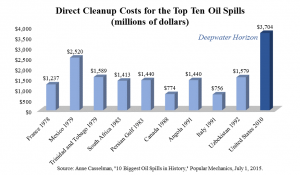Private-Public Partnerships Move to Improve Texas Energy and Environment
Apart from obvious biological costs of the Deepwater Horizon oil spill in 2010, there were heavy indirect costs associated with the spill which most economists will likely never be able to calculate accurately. These intangible costs include the heavy blow dealt on the Gulf’s tourism sector that year.
The mere cleanup costs of similar spills have been monumental:
Note: These figures are projections based on the estimated average cost of cleaning up a single barrel of oil in today’s dollars. They do NOT include the cost to other industries, countries, outstanding damages to private property or the value of lost oil. In the case of Mexico in its 1979 Ixtoc I spill, these three external estimated costs totaled an astonishing $872 million.
Unsurprisingly, British Petroleum estimates that over 30 percent of medium-term oil production will be offshore oil, hence risk management strategies are not only a foremost ethical parameter but a rational metric for increasing a company’s profitability. Bearing this end in mind, the University of Houston and Texas A&M at Corpus Christi are forming the Subsea Systems Institute and Texas OneGulf, and will enjoy close collaboration with NASA, Rice University, ExxonMobil, Halliburton and Sclumberger among others. The two research organizations — aided by the private sector — will pioneer deep-sea drilling technologies designed to protect the environment and private enterprises through safer and more cost-effective deep-sea drilling practices.
Our vision is to create an institute that is recognized around the world as the undisputed leader in transformative deepwater technology… We will create, test, and provide the technologies that industry will need in the next five to 10 years.
– Ramanan Krishnomoorti, Chief Energy Officer and Interim Vice President for Research and Technology Transfer at the University of Houston

Is the graph supposed to be in millions?
Nevermind, I read the explanation at the bottom. Isn’t this more evidence that the global oil trade is very costly?
Hey Evalynde,
Thanks for your comment, though I think that the short answer is, it’s complicated.
When you put it into context, anthropogenic offshore oil spills (which account for 8 percent of oil contaminants in the ocean according to NatGeo) are actually less of an issue than you would think compared to the collective oil accumulated and dispersed through runoff from highways and such. Furthermore, these anthropogenic sources actually account for much less than 40 percent of the oil in the ocean (the rest is actually naturally-occurring oil that escaped from underground deposits). At the local level, however, of course. Oil spills are VERY damaging to the environment and economy, which is why endeavors like these deserve our support!
However, we shouldn’t forget that over time, much of the expensive harm an oil spill can do can also be done by: nuclear, solar and even geothermal energy resources.
All of these energy generation processes utilize methods which rely on heating water and/or using hydraulic mining methods, and in some cases, if that water is returned to an ecosystem too quickly, it can:
– saturate the water with dangerous chemicals (in the case of irresponsibly executed hydraulic mining);
– reduce oxygen content, suffocating fish and hurting the food chain;
– change migration patterns, affecting both the ecology of the area and industries that rely on marine life;
– create algal blooms, which literally create an explosion of microscopic plant life which suck all the oxygen out of the water and can cause a complete collapse of the biosphere, creating ‘dead zones,’ quite creepy.
The problem I see is not necessarily the process, but responsibility when it comes to administering its costly risks. Negligent companies can manufacture a wide array of goods and hurt the environment. As of now, even with its known externalities, oil is one of the most efficient sources of energy that we have, otherwise solar, wind, etc. would be eating their lunch! Renewable energies are still very much in a development stage, while nonrenewables have had decades to mature and build the necessary infrastructure for low-cost development and transit.
Here are some links if you want to start your own research:
http://www.livescience.com/5422-natural-oil-spills-surprising-amount-seeps-sea.html
http://www.livescience.com/9885-faq-science-history-oil-spills.html
http://news.nationalgeographic.com/news/2014/03/140325-texas-pollution-oil-spills-animals-science/
http://www2.epa.gov/nutrientpollution/harmful-algal-blooms
Thanks for the response! I really appreciate how well researched everything you write is 🙂
No problem!